Have you ever had someone in your office come to you and said “Hey, nice work!” and it just made your day better. Well that’s what micro-affirmations do. They’re those small, genuine moments where someone acknowledges you or what you’ve done. These might seem small but these have huge impact on your confidence. These small but powerful gestures are starting to get noticed by psychologists and workplace experts as a great way to boost confidence and create a positive vibe wherever you are.
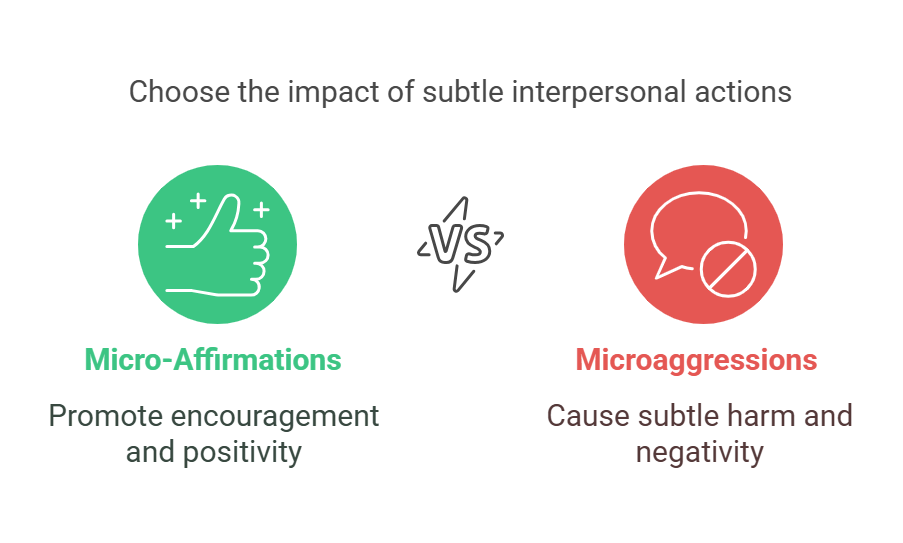
So, what exactly are micro-affirmations? Think of them as small, intentional acts of encouragement or acknowledgment. They’re like the opposite of microaggressions (you know, those sneaky, negative comments or actions that make you feel crappy). Instead, micro-affirmations are all about lifting people up, including yourself.
Here’s what they might look like:
– A coworker says, “You nailed todays meeting—great job!”
– A friend texts you out of the blue, “Hey, just wanted to say I’m super proud of how far you’ve come.”
– Or you catch yourself thinking, “I really crushed that project—I put in the work, and it paid off.”
They may seem small & wont matter much at the beginning, but they add up over time. They remind you that you’re capable, appreciated, and worthy. The term was coined by Mary Rowe an professor at MIT. She noticed how these little positive actions can make a huge impact especially when compared to microaggressions, which slowly chip away at confidence. Micro-affirmations, on the other hand, quietly build you up, bit by bit.
Why Micro-Affirmations Matter
Why do micro-affirmations work so well? It’s pretty simple—they give your brain a little boost. A study from 2020 found that even small, consistent bits of positive feedback can improve someone’s self-worth by 20% in just three months. Wild, right? It’s all thanks to dopamine, that feel-good chemical in your brain. Every time you get a little acknowledgment, it triggers dopamine, making you feel more motivated and confident.
Dr. Claudia Harris, a psychologist, explains it perfectly: “Micro-affirmations are like little reminders to someone that they matter. Over time, those small moments add up and make a big difference to self-esteem.”
The Workplace Perks
Let’s talk about how this plays out at work. Picture this: you’re in a meeting, and your manager says, “Hey, that idea you shared last week really helped move the project forward.” Feels pretty great, right? Those little moments of recognition aren’t just nice—they can actually make a big difference in how people work together and get things done.
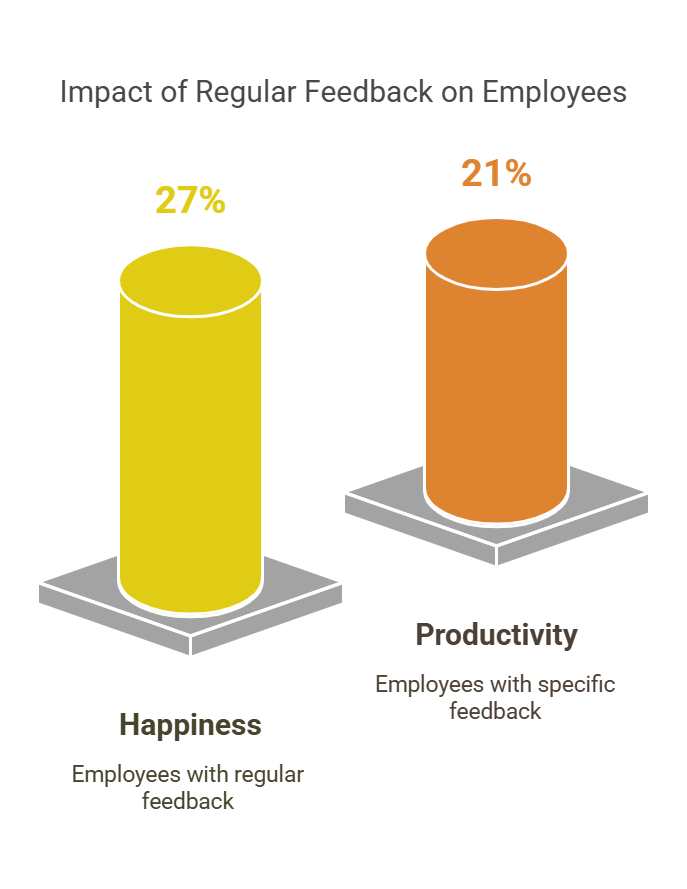
A 2022 Gallup study found that employees who got regular, specific feedback were 27% happier with their jobs and 21% more productive. And it’s not just about managers giving kudos—one company started doing weekly shout-outs where coworkers highlighted each other’s contributions. Within six months, their engagement scores shot up, and turnover dropped by 10%. Crazy how something so small can have such a big impact, isn’t it?
How Micro-Affirmations Build Self-Esteem
Let’s break it down—why do micro-affirmations work so well? Turns out, they’re like little building blocks for confidence. Here’s how they do their thing:
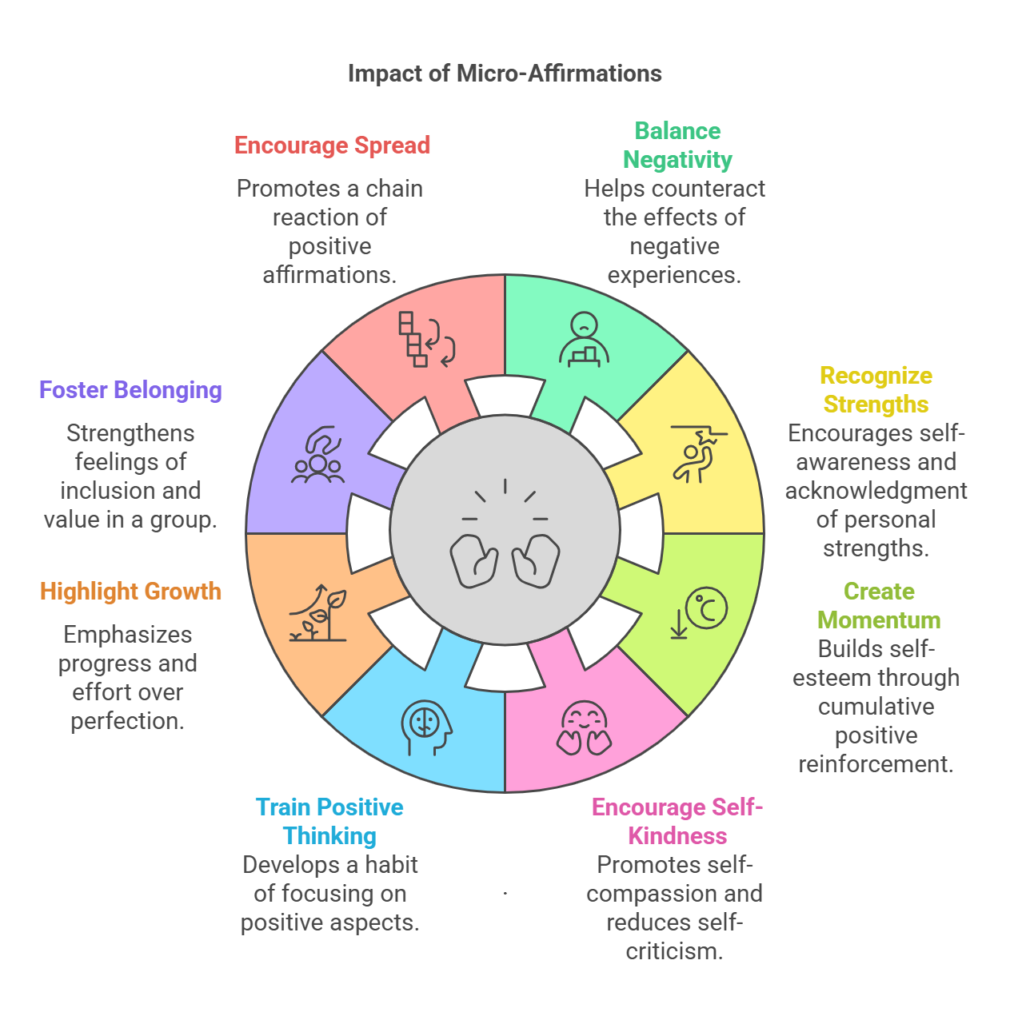
1. They Balance Out the Negativity
Ever notice how one mean comment can stick with you way longer than a dozen nice ones? That’s because our brains are wired to focus on the bad stuff (it’s called negativity bias). Micro-affirmations help tip the scales back toward the positive.
Example: Your boss gives you a quick nod during your presentation. That tiny gesture can help quiet the self-doubt spiraling in your head.
2. They Help You See Your Strengths
The more you’re reminded of what you’re good at—whether it’s from someone else or yourself—the more it becomes part of how you see yourself. If people keep pointing out that you’re great at solving problems, you start to believe it.
3. They Create Momentum
Building self-esteem isn’t about one big “aha!” moment. It’s about the small, steady wins that add up over time. Every little affirmation is like adding a layer to your confidence snowball, making it bigger and stronger as it rolls along.
4. They Remind You to Be Kind to Yourself
Let’s be real—most of us are way harder on ourselves than we should be. Micro-affirmations give you a chance to break that cycle of self-criticism.
Example: Instead of beating yourself up for not crossing everything off your to-do list, think, “I knocked out three big tasks today, and that’s progress.” It’s all about shifting from judgment to self-compassion.
5. They Train Your Brain to Spot the Good
The more you practice recognizing the positives—in yourself or others—the more your brain gets used to it. It’s like working out a muscle: over time, noticing the good becomes second nature.
Fun Fact: Neuroscientist Dr. Rick Hanson says our brains are like Velcro for bad experiences and Teflon for good ones. But with intentional practices like micro-affirmations, you can teach your brain to hold onto the positive moments a little longer.
6. They Highlight Growth, Not Perfection
Micro-affirmations aren’t just about giving a pat on the back for what you’re already good at—they’re also about noticing the effort you’re putting in and the progress you’re making. It’s like a little nudge that helps you shift from thinking, “I’m so bad at this,” to, “You know what? I’m getting better, and that’s what counts.”
Here’s an example: If you think, “I’m bad at public speaking,” try saying, “I worked hard on that presentation, and I’m getting better.” Or imagine someone saying, “You’ve been working so hard, and I can see how much better you’re getting.” Feels good, right? Small comments like that can really remind you that your effort is paying off. Simple words can make a big difference.
7. They Make You Feel Like You Belong
Let’s be honest—feeling like you’re part of a group is a big deal. When someone acknowledges your contributions, talents, or even just your presence, it sends a clear message: “You matter.”
Example: A simple, “Your input in that meeting really helped,” can make you feel valued and included, whether it’s in a team, a friendship, or even your family.
8. They Spread Like Wildfire
One of the coolest things about micro-affirmations is that they’re contagious. When someone gives you a genuine compliment or acknowledgment, it often inspires you to do the same for someone else. It’s a ripple effect of positivity.
Example: You tell your coworker, “I really admire how you handled that tough situation,” and later, they compliment someone else. It’s a chain reaction that lifts everyone up.
Micro-Affirmations vs. Big Affirmations
You might be wondering, How is this different from those big affirmations everyone talks about? You know, the ones where you stand in front of a mirror and tell yourself, “I’m unstoppable!” Yeah… those can feel a little cheesy, right?
Here’s the difference:
- Big affirmations are broad and sometimes feel out of reach, especially if you’re struggling. Saying “I’m amazing at everything” when you don’t believe it can feel fake.
- Micro-affirmations, on the other hand, are specific and real. They’re about small wins and actual traits. For example: “I handled that tough email really well today.” That feels doable, right? And way more genuine.
How to Use Micro-Affirmations in Your Life
Alright, so how do you actually start using these little confidence boosters in your day-to-day? Honestly, it’s easier than you’d think. Here’s the lowdown:
1. Hype Yourself Up
First, you’ve gotta be your own biggest fan. Seriously, when you do something even remotely good, give yourself some credit! It doesn’t have to be a big deal, just notice the little wins and pat yourself on the back.
- “I nailed my workout today—go me!”
- “Handled that stressful call like a pro. Not bad, huh?”
If you’re into journaling, jot these down. Looking back at all your small wins can be a real mood booster, especially when you’re having one of those “meh” days.
2. Pass It On
Don’t keep all that good energy to yourself—spread it around! Compliment your friends, coworkers, or even that random person who held the door for you. It doesn’t have to be a big speech, just something genuine.
- “You killed it in that meeting—great job!”
- “I really appreciate how you always think things through. It’s awesome.”
It’s wild how a simple compliment can totally make someone’s day. And honestly? It feels good for you too. Win-win.
3. Make It a Thing
The trick is to make this a regular thing, not just a one-off. Maybe set a little reminder for yourself—like, “What’s one thing I did well today?” or “Who can I compliment?” The more you do it, the easier it gets. Pretty soon, it’ll be second nature to notice the good stuff.
The Science of Small Gestures
Let’s talk about why these tiny little micro-affirmations actually pack such a big punch. The data doesn’t lie:
- It takes three positive interactions to cancel out just one negative one. Yup, our brains are wired to hold onto the bad stuff longer (thanks, negativity bias). Psychologist Barbara Fredrickson found that it takes triple the good vibes to even things out.

- Feeling recognized at work makes you way more engaged. According to Gallup, employees who feel appreciated are 4.6 times more likely to actually care about their jobs. Recognition isn’t just a nice-to-have—it’s a game-changer.
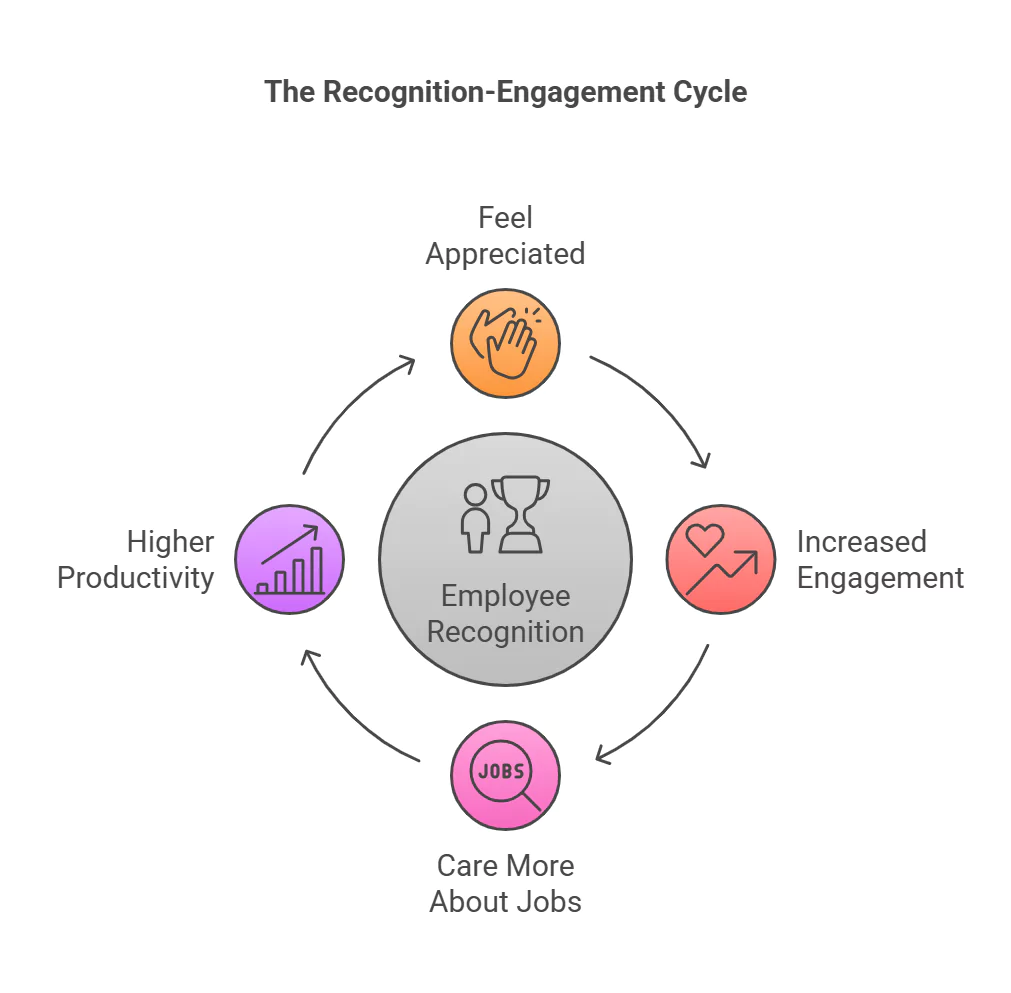
- Talking to yourself in a positive way can literally lower stress. A Stanford study found that practicing positive self-talk can help you stay calm and even solve problems more effectively. Who knew hyping yourself up could be such a superpower?
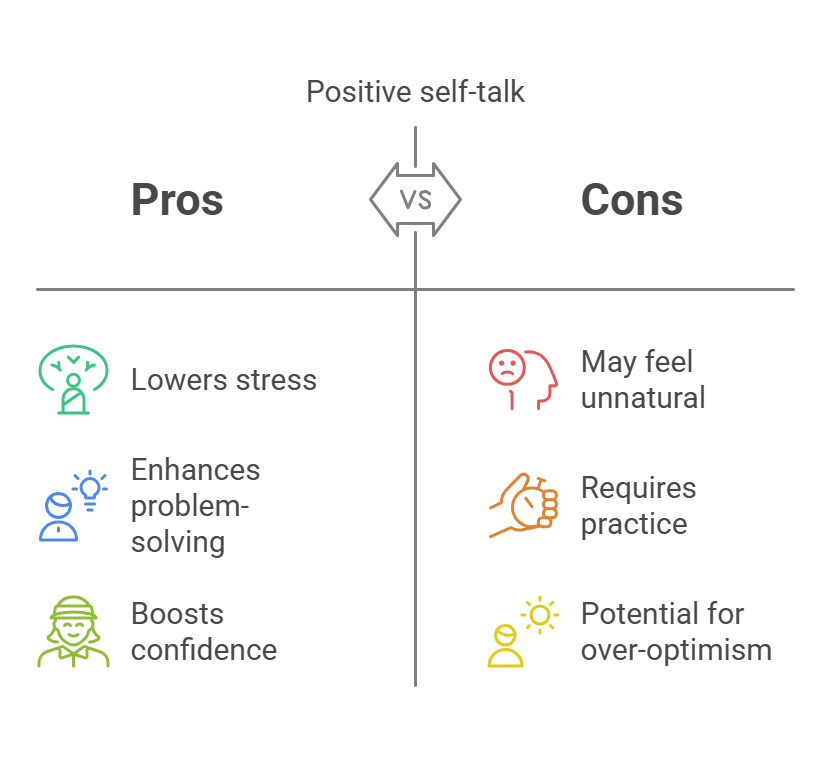
See? These small gestures aren’t just warm fuzzies—they’re backed by science.
Final Thoughts: Small Gestures, Big Impact
The best thing about micro-affirmations? They’re so simple. You don’t need a big speech, some fancy plan, or an over-the-top gesture. They’re just little moments—small pats on the back, quick compliments—that can change someone’s day, help shift your mindset, and slowly build up confidence over time.
So, why not give it a go? Think of one thing you crushed today—maybe it’s something small like sticking to your to-do list or having a great conversation—and give yourself a little credit for it. Then, pass it on. Text someone a quick compliment or let them know you appreciate them. Those small, feel-good moments? They snowball into something way bigger than you’d expect.
Study & Reference Links
- Barbara Fredrickson’s Positivity Ratio:
https://www.positivityratio.com - Gallup’s Employee Recognition Study:
https://www.gallup.com/workplace/236441/employee-recognition-low-cost-high-impact.aspx - Stanford University’s Positive Self-Talk Research:
https://www.stanford.edu (Specific study details may require deeper searching directly on Stanford’s site.)







